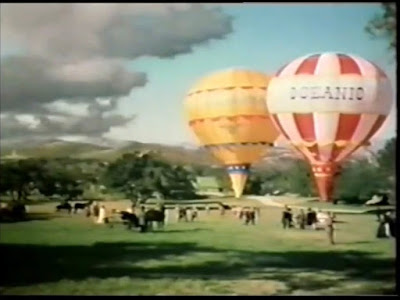Big Red (Dir: Norman Tokar, 1962).
Rather than a movie about a popular brand of cinnamon flavour chewing gum, Big Red is a doggy drama in the classic Walt Disney tradition of live-action animal adventures.
Based upon the novel by James Kjelgaard, Big Red relates the story of crusty hunter and dog trainer James Haggis (Walter Pidgeon), who pays a hefty sum for Red, an Irish Setter with potential as a champion show dog. Out of the woods and into their lives wanders Rene (Gilles Payant), a French speaking orphaned lad who loves animals and needs a job. Employing Rene to care for his hounds, the boy soon bonds with Red; something which proves detrimental to the Setter’s training. Excitement with injured dog, runaway boys and menacing mountain lions follows, before the forgone happy conclusion.
Produced by Disney’s True Life Adventures stalwart Winston Hibler and directed by studio regular Norman Tokar, Big Red is a sturdy, old fashioned yet handsomely mounted outdoors adventure; one of a trio of French Canadian dramas produced by Disney in the 1960s alongside Nikki, Wild Dog of the North (Don Haldane and Jack Couffer, 1961) and The Incredible Journey (Fletcher Markel, 1963). As with those movies, the animal actors here are arguably more engaging than their human co-stars. Emile Genest, as a live-in ranch hand, shares some tender scenes with youngster Payant, while Pidgeon puts in a solid performance as Haggis. However, the real star is the gorgeous Irish Setter of the title.
The story itself offers few surprises, but is engagingly told and, save for a scene with a comic moose, is happily free from the kind of slapstick which sometimes marred Disney’s live action productions. With its gentle sentimentality and a somewhat languid pace, it may be a hard sell for modern family audiences and is notable by its omission from the Disney+ streaming service. However, Disney fans of a certain age will certainly get nostalgic pangs for the days when a charming, effects free dog and boy bonding tale passed muster as matinee entertainment.
Following the critical and commercial success of Old Yeller (Robert Stevenson, 1957), boy and dog movies became a staple of the Disney Studios' output for the next two decades. While Big Red doesn’t do much to distinguish itself from the pack, its combination of beautiful scenery and cute canines, not to mention a couple of tuneful numbers from Mary Poppins composers Richard and Robert Sherman ensure a product of significant pedigree. While it is perhaps not best of breed, Big Red is a good dog tale nonetheless and will undoubtedly strike a chord with anybody who has ever loved a pet.







